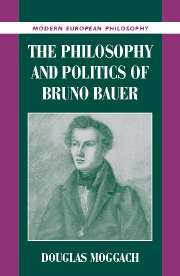Book contents
- Frontmatter
- Contents
- Preface
- THE PHILOSOPHY AND POLITICS OF BRUNO BAUER
- Introduction: “The Friend of Freedom”
- I FOUNDATIONS: AESTHETICS, ETHICS, AND REPUBLICANISM
- II JUDGING THE OLD ORDER
- III THE EMANCIPATORY PROJECT
- IV JUDGING THE REVOLUTIONARY MOVEMENT
- Epilogue: After the Revolution: The Conclusion of the Christian-Germanic Age
- Appendix: Bruno Bauer, “On the Principles of the Beautiful” (1829)
- Notes
- Bibliography
- Index
Introduction: “The Friend of Freedom”
Published online by Cambridge University Press: 05 June 2012
- Frontmatter
- Contents
- Preface
- THE PHILOSOPHY AND POLITICS OF BRUNO BAUER
- Introduction: “The Friend of Freedom”
- I FOUNDATIONS: AESTHETICS, ETHICS, AND REPUBLICANISM
- II JUDGING THE OLD ORDER
- III THE EMANCIPATORY PROJECT
- IV JUDGING THE REVOLUTIONARY MOVEMENT
- Epilogue: After the Revolution: The Conclusion of the Christian-Germanic Age
- Appendix: Bruno Bauer, “On the Principles of the Beautiful” (1829)
- Notes
- Bibliography
- Index
Summary
To understand Bauer, one must understand our time.
What is our time? It is revolutionary.
Edgar Bauer, October 1842Bruno Bauer has provoked intense controversies since the 1830s, yet his work remains inaccessible, his meaning elusive. He is most familiar as the object of Marx's sharp polemical attacks in The Holy Family and The German Ideology, though Albert Schweitzer, in his widely noted Quest of the Historical Jesus, gives him a receptive and sensitive reading. He is far more complex a figure than the caricature that Marx's denunciations make of him. In the decisive political circumstances of the German Vormärz, the prelude to the revolutions of March 1848, Bauer's is the voice of an original republicanism, inspired by Hegel. He is a theorist of revolution, of its causes and its failures. Analysing the emergent tendencies of modern society, he criticises both the old order and new ideological currents in the interests of a profound, republican liberation.
The literature on the Hegelian Left has depicted in diverse ways the revolution that Bauer theorises: as abstract-utopian posturing, as a religious crisis, or as a cultural degradation or mutation. Recent commentators stress the political dimensions of the crisis and the interest of the Left Hegelians, Bauer foremost among them, in developing a theory of popular sovereignty and citizenship. Important studies have linked them to the literary and political currents of their time and traced the changing patterns of their relationships with early French socialism.
- Type
- Chapter
- Information
- The Philosophy and Politics of Bruno Bauer , pp. 1 - 18Publisher: Cambridge University PressPrint publication year: 2003

